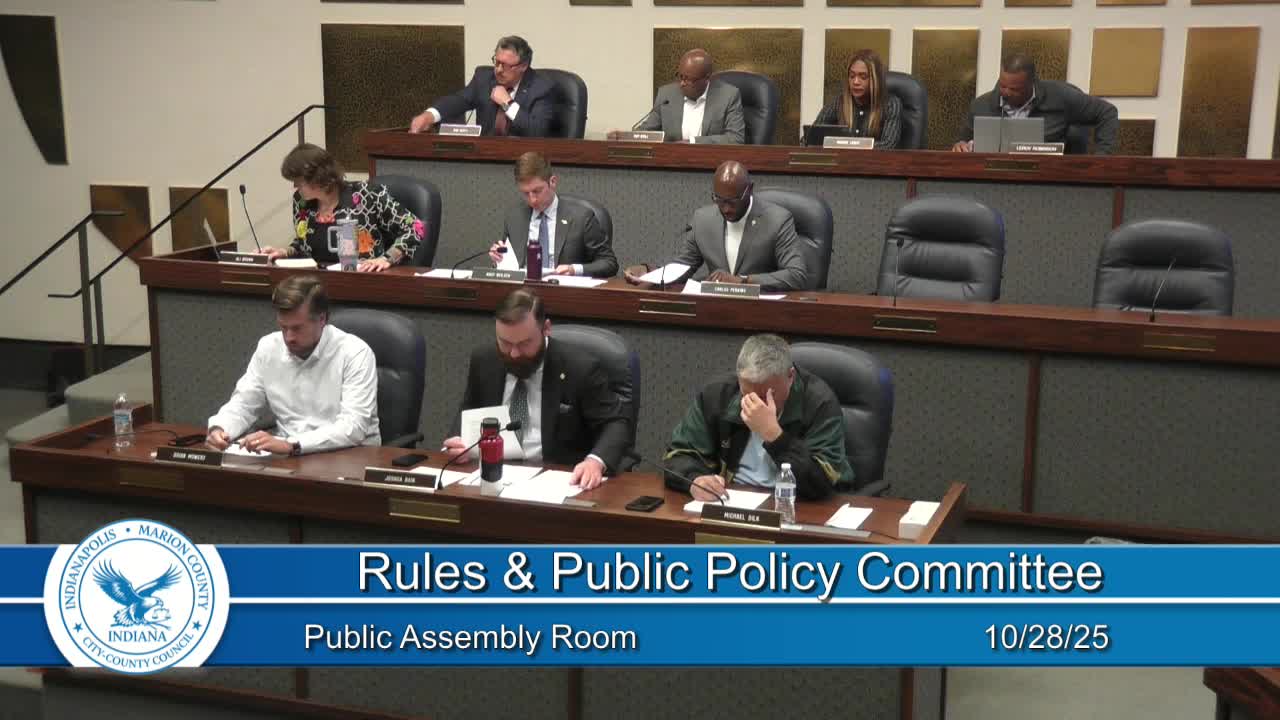Indianapolis rules committee reviews harassment-policy overhaul, weighs independent oversight and anonymous reporting
Get AI-powered insights, summaries, and transcripts
Subscribe
Summary
The Indianapolis City-County Rules Committee met Oct. 28 to review steps the administration has taken over the past 15 months to update workplace harassment policies and to consider additional legislative options, including independent oversight and expanded reporting channels.
The Indianapolis City-County Rules Committee met Oct. 28 to review steps the administration has taken over the past 15 months to update workplace harassment policies and to consider additional legislative options, including an independent inspector general, an independent human resources board and expanded reporting channels.
Committee members front-loaded presentations from the corporation counsel, outside advocates and human-resources professionals and heard public comment from a former city employee who said the workplace culture remains broken. The meeting produced no ordinance or binding council action on the policy reforms, but the committee approved a procedural change to extend public-comment time from two to four minutes.
The nut graf: Councilors pressed administration representatives for specifics on implementation, timetables and confidentiality safeguards for the enterprise’s new tools — especially Speakfully, the third-party anonymous-reporting vendor the city selected this year — and sought options that would create meaningful, independent oversight while preserving complainant confidentiality.
Brandon Beeler, corporation counsel for the City of Indianapolis, summarized steps city human resources and the Office of Corporation Counsel have taken. He said harassment training for supervisors was made mandatory by city ordinance in 2019 and that a mayoral executive order in August 2024 requires annual harassment training for all employees; the current training release for supervisors and nonsupervisors went out Sept. 9 and has a completion date of Nov. 30, 2025. Beeler said HR provides in‑person sessions to cover employees who lack city email or computer access and that last year HR conducted 10 in‑person trainings.
On anonymous reporting, Beeler said the city evaluated six vendors and selected Speakfully; the city temporarily used an internal ISA tool while finalizing Speakfully, and officially launched Speakfully in January 2025. He described Speakfully as a chat‑style interface that allows employees to remain anonymous while HR investigators ask follow‑up questions intended to gather enough information to open an investigation without immediately requiring the reporter’s name.
Beeler gave additional program details: the city convened internal planning, advisory, harassment-policy and company-culture working groups; the harassment-policy working group, led by Chief Diversity Officer Ben Tapper, revised the harassment policy this year and the advisory group approved an updated policy that will be incorporated into the HR manual and an employee acknowledgment form. The company-culture working group, led by Wes Jones of the Office of Audit and Performance and Tapper, oversaw a cultural assessment survey and a Reftellus‑led process that included nine focus groups; Beeler said final survey results and recommendations were expected by the end of the year.
Councilors repeatedly asked about confidentiality, independence and whether complainants and witnesses would be kept apprised during investigations. Beeler said HR is developing standard operating procedures to keep complainants updated and to protect safety, including making workplace changes if needed during an inquiry. He also noted that five county offices maintain their own HR shops and handle relevant matters internally.
Members of the public and outside experts urged stronger independence and survivor protections. Emma Davidson Tribbs, identified as co‑founder and director of the National Women’s Defense League, recommended (1) unbiased, third‑party criminal support for reporting and investigation, (2) a centralized intake and an independent human‑resources support office with clear escalation rules and trained investigators, and (3) firm survivor confidentiality, anti‑retaliation protections and publicly available oversight data to rebuild trust.
Tracy Justice, director of government affairs for Indy SHRM, reviewed HR best practices and relevant case law. Justice stressed that public‑sector HR must balance compliance and employee protections, and she summarized the Faragher and Ellerth framework: employers who provide accessible reporting procedures, regular training and prompt, documented investigations have a legal defense against some harassment claims when employees unreasonably delay reporting. She told the committee that strong, consistently enforced reporting procedures and training are central both to protecting employees and to limiting employer liability.
Councilors pressed whether a truly independent inspector general or HR board could operate without turning confidential investigatory material into public records. Beeler said that independence is a goal but noted the tension between creating independent oversight and open‑records rules that can make investigatory material public, which can also expose complainants. Several councilors urged the committee to pursue mechanisms that maintain confidentiality while increasing independence.
Public comment included a four‑minute statement by Morgan Mickelson, a former city employee who described raising concerns internally without seeing remedial action and urged the committee to require measures ensuring implementation and transparency.
Votes at a glance - Motion to extend public‑comment time for the meeting from two minutes to four minutes: moved by Councilor Andy Nielsen, seconded (unspecified); approved by voice vote with no opposition announced.
Discussion versus decision - Discussion: committee debate focused on the seven recommendations the working group compiled (temporary ad hoc inspector general; independent HR board; consideration of an independent office of equal opportunity; promoting reporting tools and awareness; audits of HR investigations; universal harassment‑free workplace policies; yearly aggregate reporting of harassment statistics) and on operational details for Speakfully, training rollout and the cultural assessment survey. - Direction: committee members requested copies of the updated harassment policy and asked administration representatives to provide more specific timelines and clarifications on SOPs for Speakfully, complainant updates, and how referrals from independent county offices are handled. - Formal action: the only formal action recorded at the meeting was the procedural vote to extend public comment time; no ordinances or binding policy changes were passed at the Oct. 28 meeting.
Ending: Committee members said they will continue meetings with HR, corporation counsel, the working groups, and outside advocates; they asked for wider public outreach and said they will refine and publicize formal recommendations before proposing ordinance or other binding actions.
